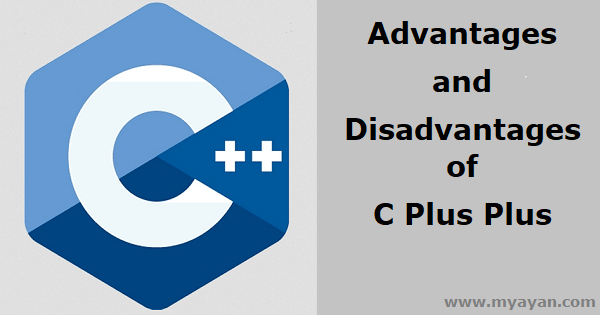C++ is one of the oldest and most efficient high-level programming languages that students and professionals learn at school and in institutions. C Plus Plus is where some will start their programming journey often. CPP brings you features like robustness, portability, and rich libraries, but it also is complicated at the same time. At times, programmers will need to know the Advantages and Disadvantages of C Plus Plus languages to predict its scope.
C has limitations such as a lack of run time error checking and lack of OOPs. C++ has overcome these demerits effectively by incorporating many advanced-level programming concepts. Some of the advantages of C Plus Plus language are listed below.
C++ is a platform-independent language that offers portability, allowing the programmers to run the same program on different OSs. For example, a program code developed in Linux can be reused in Windows OS without any compatibility issues.
C++ brings the concept of an object-oriented approach to programmers using which developers can apply inheritance, polymorphism, abstraction, and encapsulation easily. This means the code developed can be reused in another program utilizing memory resources with the help of constructors and destructors. Having OOPs is one of the main advantages of C++ over C.
C++ is a high-level language closely related to C, as it’s a procedural language and allows low-level manipulation of data at a certain level. A program build in C Plus Plus is useful for low-level programming language and efficient performance-wise and memory-wise. Being a high-level language, C++ also offers high-level abstraction.
A CPP program uses multi-paradigm programming means it follows three paradigms Generic, Imperative, and Object-Oriented. C++ is compiled as it gains a lot of speed over other low-level languages. Compilation of programmes in CPP are pre-interpreted and executed faster than its predecessors.
The more advanced the programming language, the more support available on the forums and tutorial portals. Numerous platforms provide online courses and lectures for students. For example, students can search free codes and tutorials on w3schoools, StackOverflow, and Github.
Besides its benefits, C++ has its own limitations which also count as the leading disadvantages of C Pluss Plus programming.
Even though object-oriented programming provides a lot of security to the data compared to C, security issues still exist due to the availability of friend functions, global variables and, pointers.
You need to define the size of an array in advance to store elements. An array has a fixed size which you cannot modify once defined. This means the memory cannot be increased or decreased. Allocating less memory would shorten the number of elements while giving more memory than the requirement leads to wastage of memory space. This limitation is often counted as one of the major disadvantages of C Plus Plus programs.
The syntax in a large CPP program is often complex, and the standard library is small. This can be one of the common disadvantages of C++ as it becomes more difficult to learn for beginners. Also, a program built in C++ is platform-specific which usually turns more complex to debug.
A program built in C++ can’t support garbage collection as it does not support Dynamic Memory Allocation (DMA). Also, there is very little memory management in C Plus Plus, forcing the programmer to do most of it.
Like Arrays, linked list is also defined in advance, which turns out to be another disadvantage of C++ Linked lists. A linked list requires more memory to store the elements than an array. Each node in a linked list points to another reference. Thus it requires additional space in the memory. Also, traversing the nodes in a linked list is not random, which means wasting a lot of time.
Conclusion on Advantages and Disadvantages of C Plus Plus
Learning C Plus Plus is essential for everyone who sets on the sail to be a programmer. Despite the limitations, it’s a great tool to build high-end programmes remaining a go-to tool for millions of programmers and developers. If you are also learning this programming language, you can make the right decision about it after understanding the Advantages and Disadvantages of C Plus Plus.

Whether C++ is better than C or not is so divisive that this issue has already become one of the most controversial in computer science. Of course, we cannot guarantee that our study will settle this issue once and for all, but we can at least give it a try. For this article, we'll compare C++ vs. C from the viewpoint of four properties: expressiveness, performance, reliability, and portability.
One of the goals in C++ design is to provide better support for large-scale software engineering. That's why it has features that allow you to build components that can be reused in different programs. However, the price you have to pay is that your programs will get bigger because each component needs some space. Therefore C++ does not always give you the desired improvement in software engineering.
C++ has several security issues; thus, C++ programs aren't as secure as others. Because pointers are utilized in C++, they take up a lot of memory, which isn't always suitable for all platforms. Built-in code threads are not possible in C++.
C++ is a high-level, object-oriented programming language that includes concepts such as classes, inheritance, polymorphism, data abstraction, and encapsulation. It's great for low-level code and really effective for all sorts of applications.
C++ is a high-level, object-oriented programming language that provides dynamic typing, good performance, and control over nearly everything. C++ programs run faster than comparable Java programs. C++ is a multisystem language, which means we can create both object-oriented and procedural applications. But in Java, we can only develop object-oriented applications.